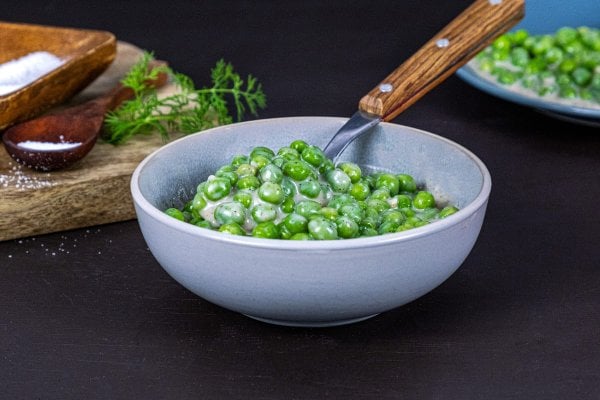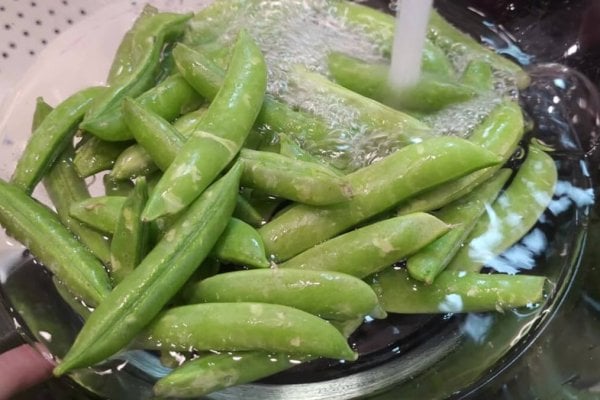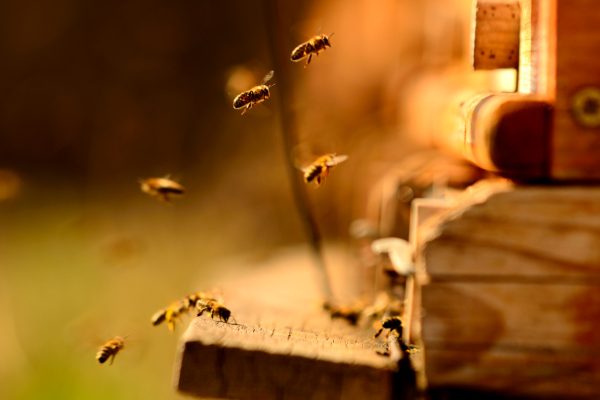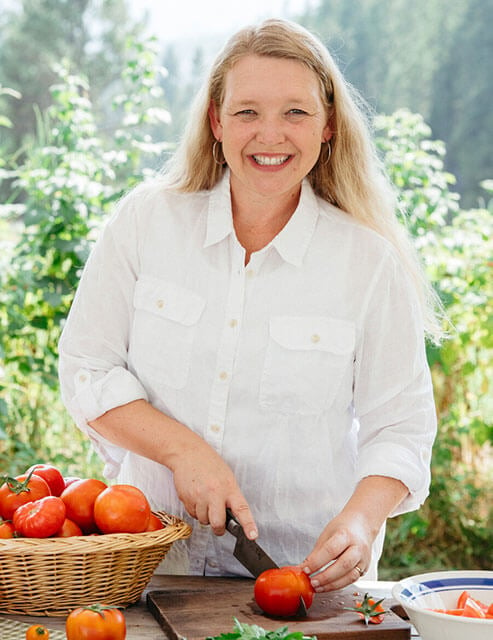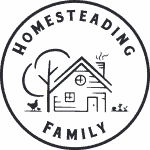In the homesteading world, there’s a bit of a misconception that if the world goes sideways, we’ll be just fine as long as we have chickens in the backyard. But many of us fail to ask if our chickens are sustainable. What if we no longer had access to commercial chicken feed? Would you know what to feed chickens then? Join me with Dalia from Chickenlandia for today’s Pantry Chat Podcast as we discuss how to feed chickens without chicken feed.
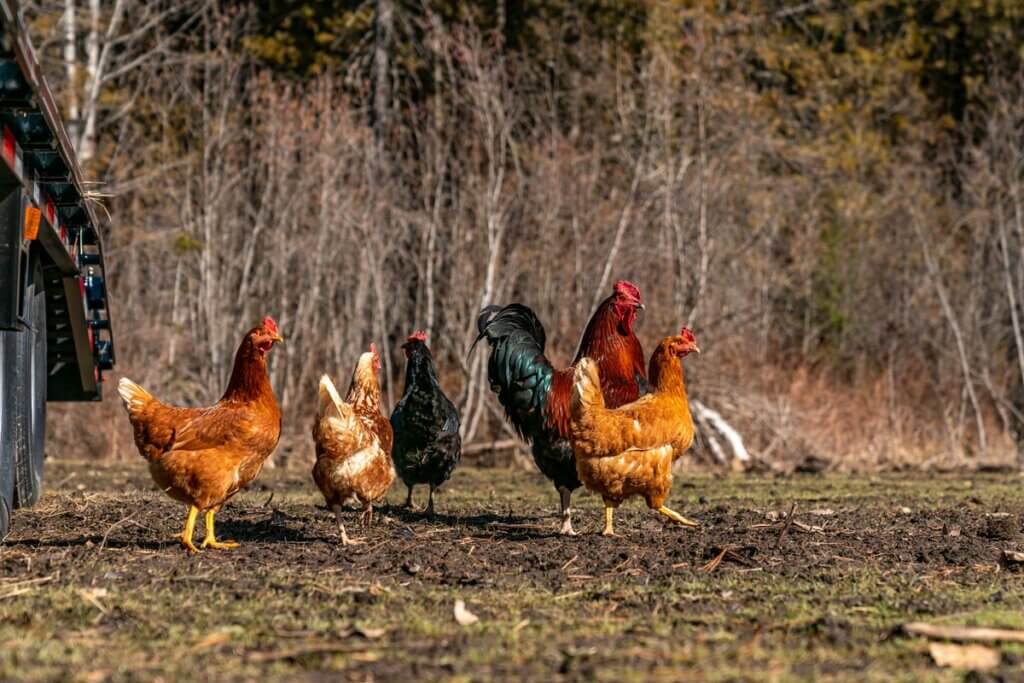
We love raising backyard egg-laying chickens as well as raising meat chickens to fill our freezers here at Riverbend. Utilizing systems like the deep litter bedding method, chicken waterers, and chicken tractors help to keep our flocks happy and healthy.
I’m excited to have Dalia from Chickenlandia on the podcast today to discuss feeding chickens without chicken feed.
Something Dalia and I have in common is frequently asking ourselves, “How did they do it before?” How did moms care for their children before public schools and screens? How did people preserve food before refrigeration? And how did we feed chickens before industrial agriculture created chicken feed?
Asking ourselves these questions can often simplify our systems and routines and help us to create more resiliency when times get hard.
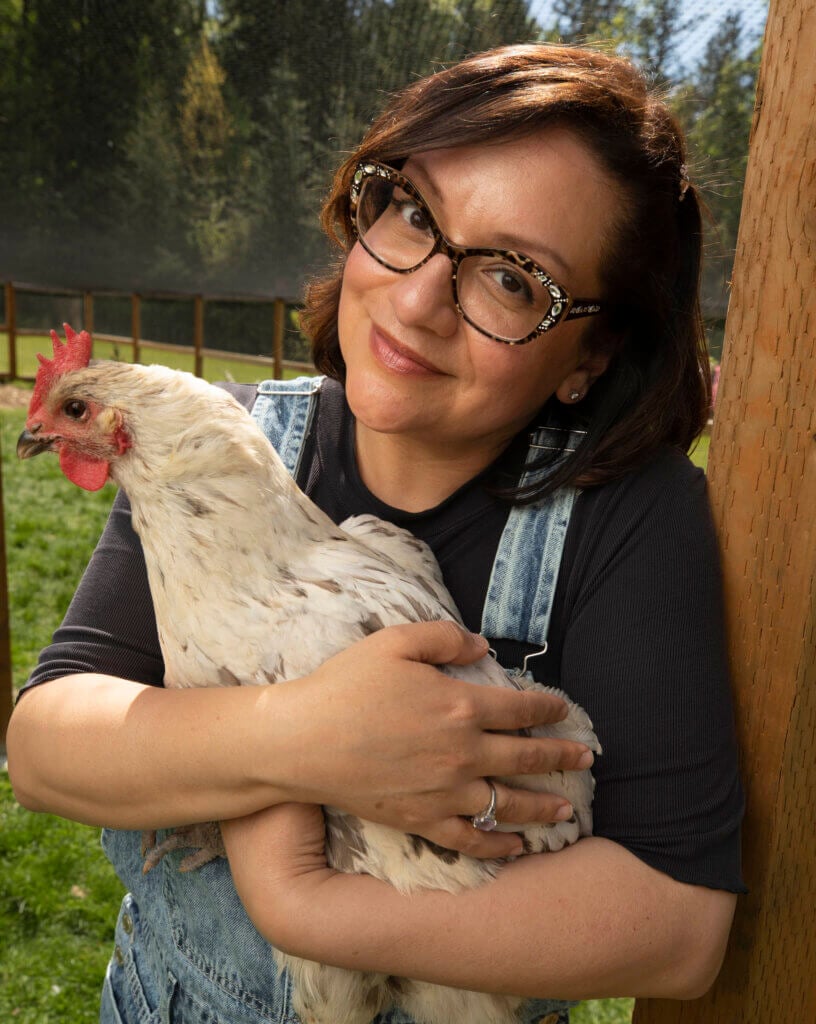
About Dalia
Dalia is the face behind the popular YouTube channel Welcome to Chickenlandia. Through her videos, website, online course, and book Let’s All Keep Chickens, she teaches a more sustainable and natural way of keeping chickens with special attention to urban and suburban environments.
Dalia and Chickenlandia’s focus is to unite people through education and entertainment regarding humankind’s most amazing common denominator: The Chicken. Regardless of the avenue, the Chickenlandia team’s goal is to share a way of keeping chickens that is fun, entertaining, and stress-free.

Should Chickens Eat Grain
We all know chickens haven’t been eating grain forever. They simply weren’t created to do so. In the wild, grains are only available a small part of the year, when grasses ripen. This means that the domesticated chickens’ predecessors had to find other sources of nutrition for much of the year. Bagged chicken feed is a newer, more modern way of feeding chickens to maximize egg production or weight gain.
The typical modern backyard chicken’s diet is comprised mostly of commercial chicken feed, followed by greens and healthy kitchen scraps, with the occasional chicken treats, mealworms and other healthy protein. But this does not mimic what chickens used to eat before industrial agriculture got involved. Today’s chickens have been bred to have such a high production rate that their nutritional requirements are significantly higher.
So should chickens eat grain? It depends!
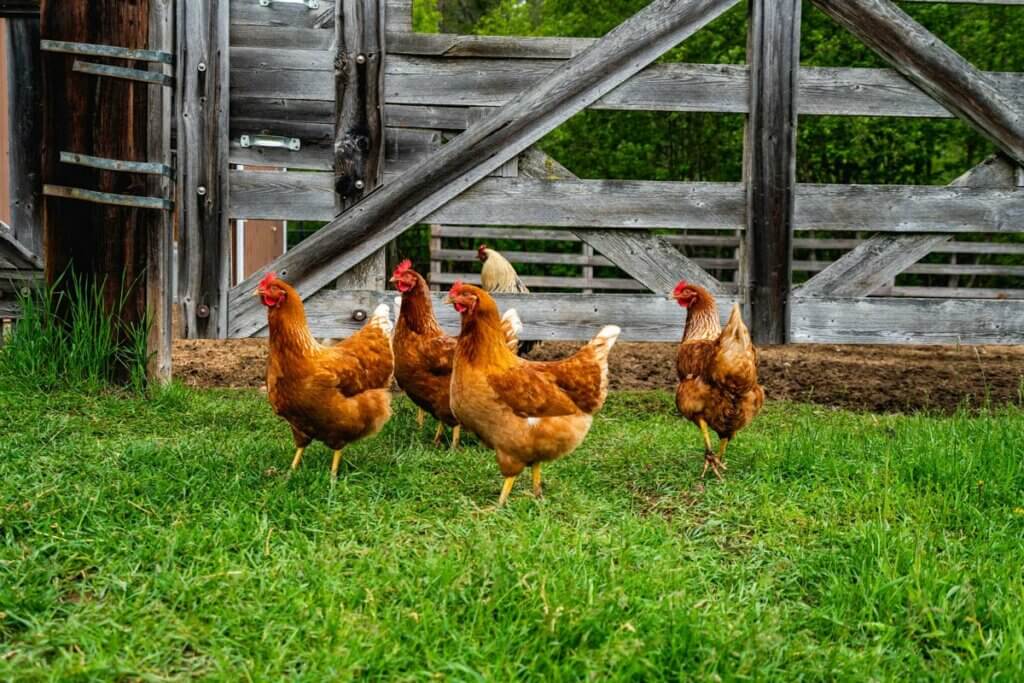
Can Chickens Survive Without Chicken Feed?
Backyard chickens 1,000 years ago likely weren’t laying an egg a day; the foraging and free-ranging of their diet wouldn’t support it.
But can chickens of today survive without chicken feed like those chickens of our ancestors? Maybe!
If you have enough land with crops growing and bugs plentiful, you can allow your chickens to forage for most of their diet from bugs and plants during the time of year that the plants are growing. Because they won’t be getting as high of a protein ratio, you won’t get as many eggs.
Right now, we are thankful for modern commercial feeds. They certainly make our lives easier and make home production much simpler. But with inflation and generally rising prices, if the cost of feed prohibits you from keeping your chickens, then perhaps it’s time to think outside the box and find another solution to feeding your chickens.
Will it be perfect? Maybe not. Will they get the exact proper ratio of protein? Maybe not. But as long as your chickens are happy and healthy, there is some wiggle room and we want to encourage you to have the freedom to find for yourself.
There are many ways you can get creative with what to feed your chickens beyond layer feed.
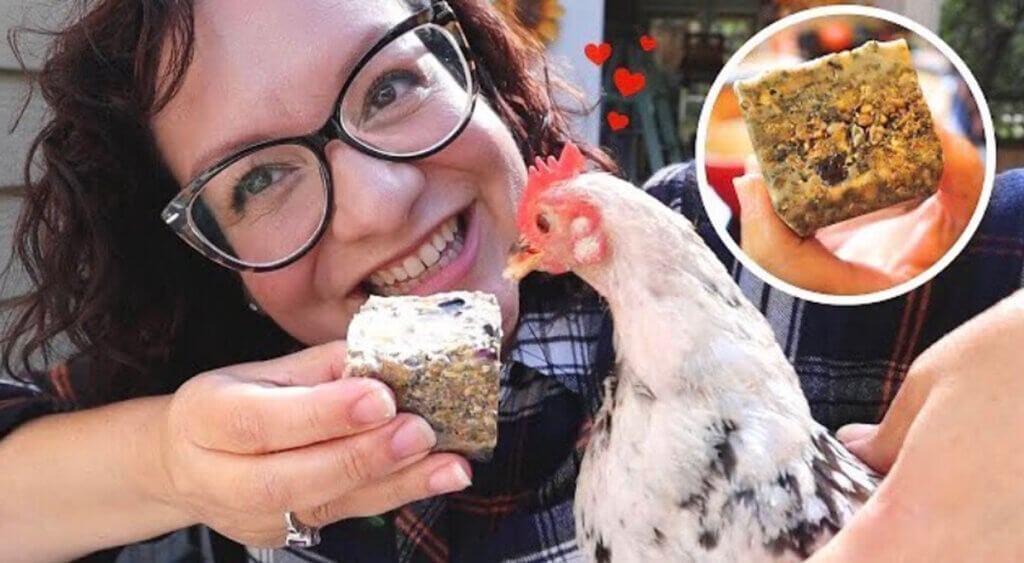
What Can Chickens Eat
When you look at the natural state of any animal and what it used to eat before domestication, we generally find that animal’s most healthy state as well.
Chickens can eat many things aside from commercial feed. It is actually to our benefit to look outside the feedbag since chickens that are allowed to free-range, peck, and scratch for bugs produce richer and healthier eggs. They’re also much healthier chickens in general.
Dalia shares about her Great Grandma in Guatemala, who would raise her chickens solely on the food waste from the family. Kitchen scraps, leftover tortillas or fruit fallen from the trees, the chickens were responsible for foraging for the rest of their meal.
Because chickens are omnivores, they will eat a wide variety of foods.
- Lawn clippings/Grass
- Snakes, frogs and lizards
- Eggs (hopefully not their own)
- Bugs
- Kitchen scraps (greens, sprouts, etc.)
- Hay
- Animals (mice, snakes, frogs, lizards)
- Crops (leftover broccoli leaves and stems, squash, and other garden scraps)
- Forage or Grain Crops (try growing a crop just to feed your chickens)
- Fruit from trees
- Fly larvae/Worms (try raising your own specifically for your chickens)
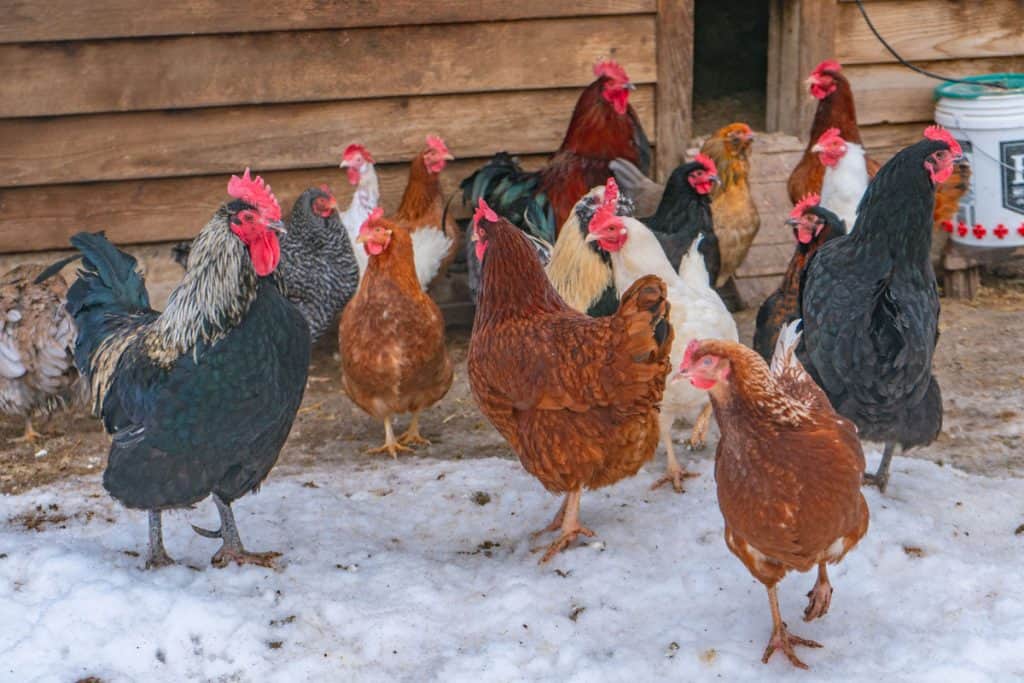
My Chickens Won’t Eat
If you’ve tried to feed your chickens grass or lawn clippings and they wouldn’t touch it, consider what the rest of their diet looks like. Are they getting a lot of grubs, treats, kitchen scraps, etc? Chickens can easily get spoiled and will turn their noses up at “lesser” food choices.
While I certainly don’t advocate starving your chickens, it may take some time (or hunger) from your chicken before it realizes that the grass clippings you’ve provided are, indeed, worth eating. Try cutting back their average ratio of commercial feed a bit for a week or two while providing them with scrumptious scraps, and they might change their minds.
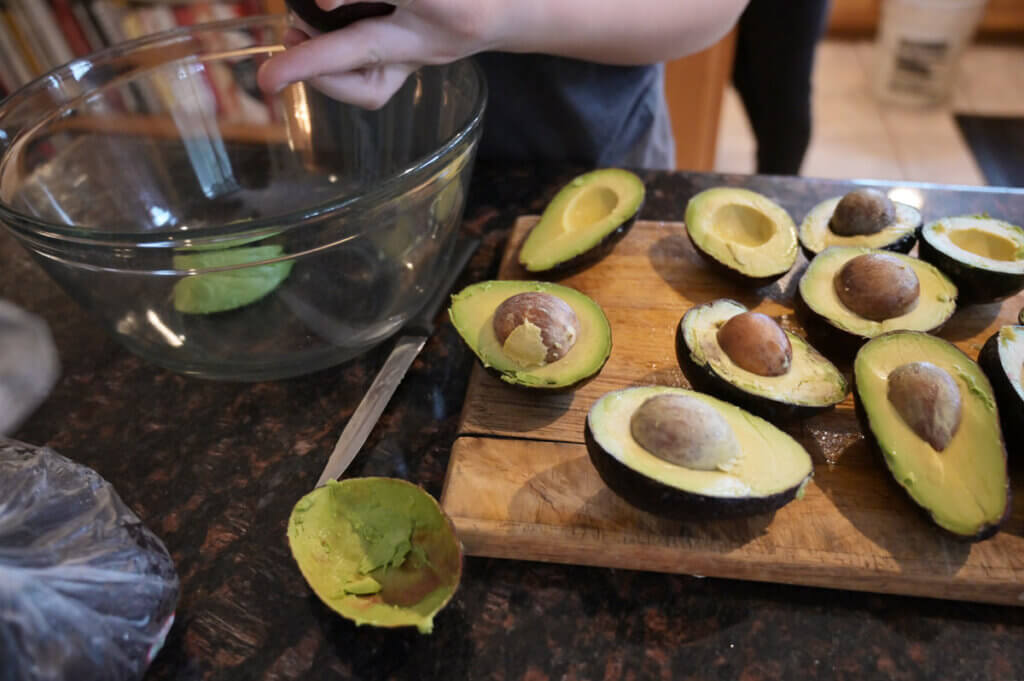
What Shouldn’t Chickens Eat
There are many theories out there about foods chickens shouldn’t eat. You may have heard that avocados aren’t good for chickens (the skins and the pit should be avoided). And while this may be true, Dalia shared that the chickens in Guatemala are eating avocadoes and doing just fine.
That said, chickens that have free-ranged for generations may have a better sense of not overeating something before it affects them negatively.
Ultimately, you don’t want to feed your chickens anything that you wouldn’t consider healthy for yourself. Getting a shipment of day-old donuts from the bakery and tossing them into the coop is not ideal. Just as with us, there needs to be a balance for your chickens to maintain their health.

No Chicken Feed? What to Feed Chickens Instead
I asked Dalia what she would feed her chickens if she could not buy chicken feed. She said she’d feed them the way her great-grandmother fed them:
- Kitchen scraps/waste
- Sprouted grains, seeds, legumes and beans
- Let them free-range for bugs and other forage
The beauty of feeding your chickens grains, seeds and legumes is that they’re all very shelf-stable. You can even save money on feed by buying them in bulk and storing them for a long time.
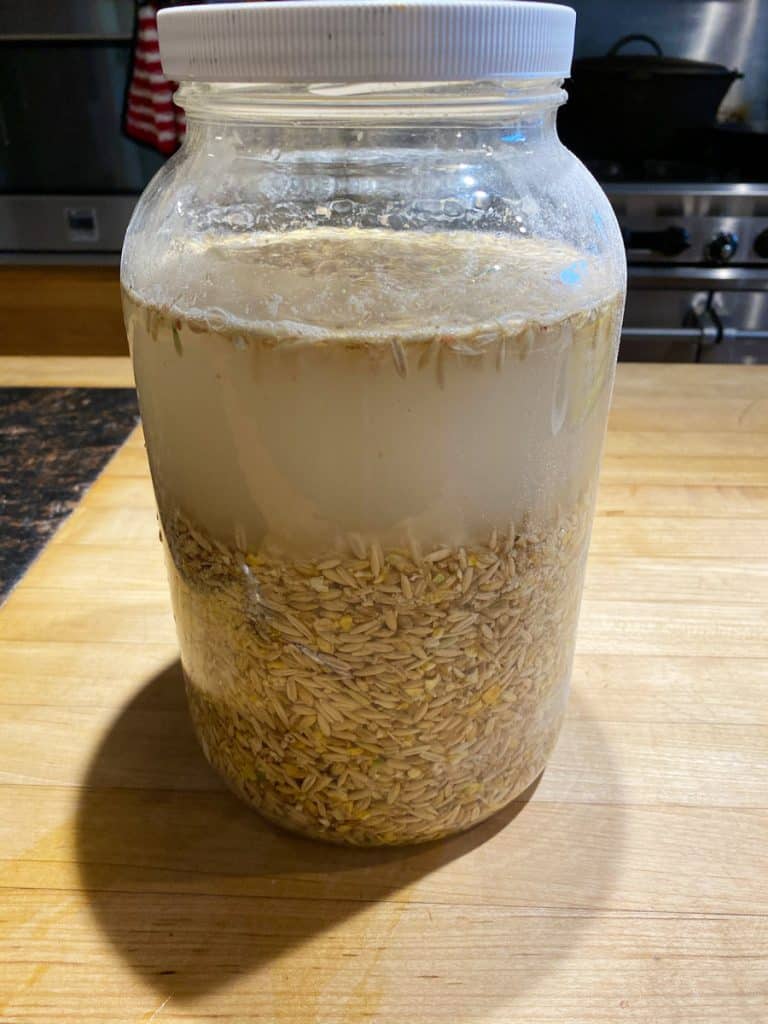

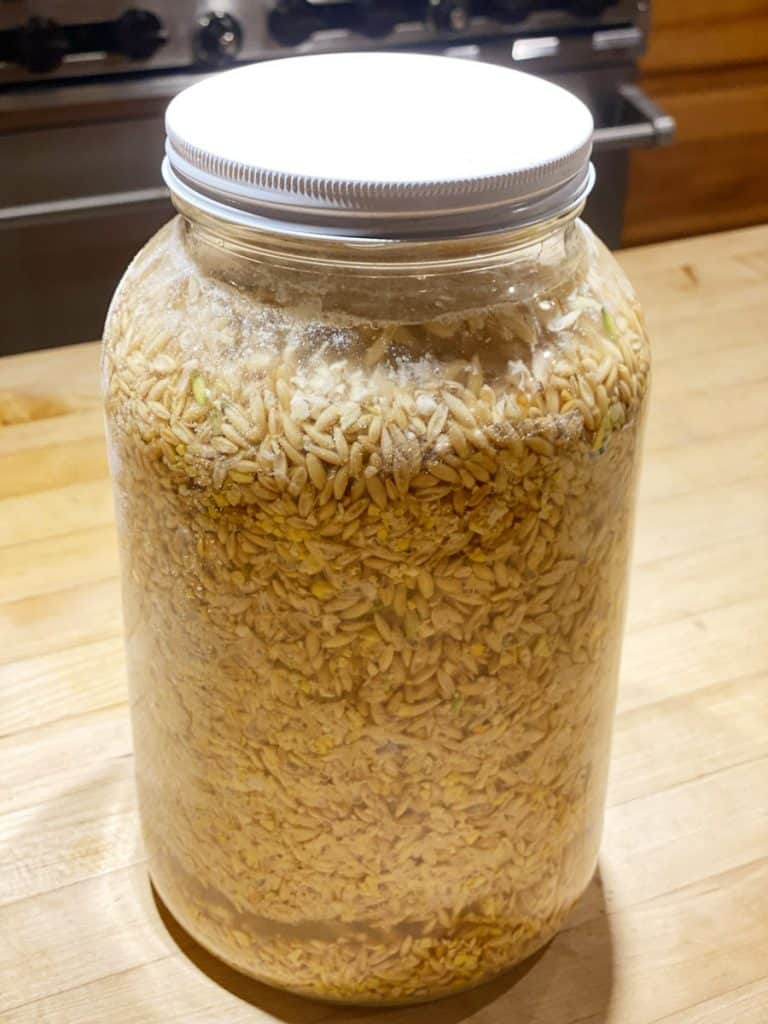
In our house, we regularly soak the grain in whey (a byproduct of making homemade cheese), significantly improving the chicken’s diet. We also ferment the chicken feed, an excellent option for stretching the grain while improving the chicken’s diet. As you can see in the photos above, this is days one, two and three of fermenting grain. Just look at how much the grain increases in volume!
If I could leave you one encouragement, it would be not to look at how you raise your animals through a factory-farm lens. Don’t lose the historical model of raising animals by replacing it with how large farm operations are doing it. Keep asking yourself what people did before modern industrial agriculture. Using your common sense is going to take you a long way.
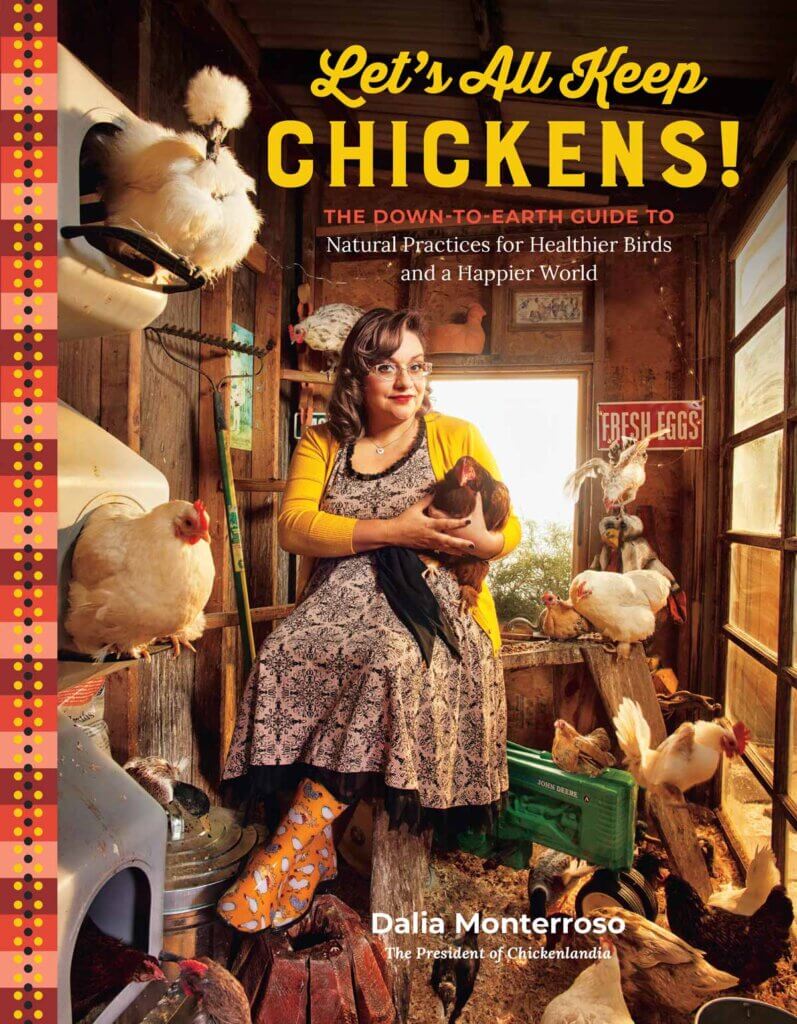
Where to Find Dalia
Be sure to check out Dalia’s book Let’s All Keep Chickens and check her out at Welcome to Chickenlandia on the following platforms:
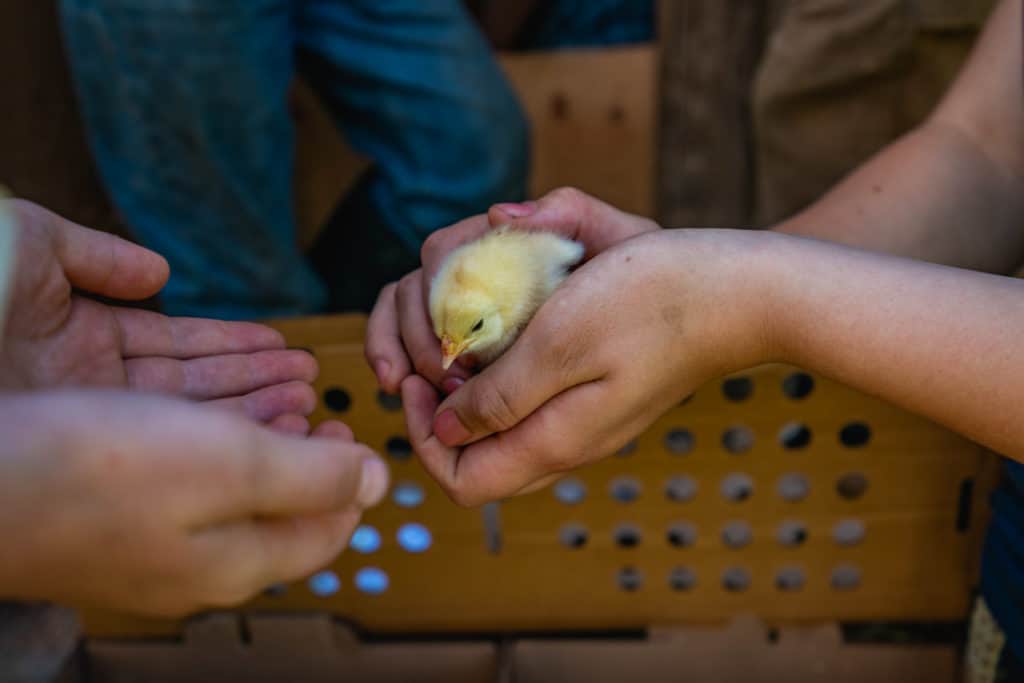
Related Articles
If you’re interested in raising backyard chickens, you may want to check out these posts:
- Caring for Baby Chicks
- Chicken Tractor Basics
- Everything You Need to Know About Raising Meat Chickens
- Using Chickens to Restore the Land
- Poultry Diseases Common to the Homestead (+Treating Them with Herbs)
- Broody Hen Management
- Butchering 1400 Pounds of Chickens in One Day
- Happy Farmer Mobile Chicken Coop Review
- How to Stock Your Barn for Winter
- Good Enough is Perfect
Carolyn: Hey you guys and welcome to this week's episode of The Pantry Chat Food for Thought. Today I am here with a special guest. I'm going to bring her on in just a second, but we're going to talk about something that is really important to me to keep this conversation going in the homesteading world. And that is on taking your backyard chickens and making them more resilient, making them more sustainable in the world that we're living in right now. It's really easy to think that just because you have some chickens in the backyard that you're good to go no matter what happens in the world. I've heard that actually a lot. I have chickens. I'll just eat eggs. But the reality is, is feed can be hard to get sometimes. So we're going to be talking about other sources of chicken feed today. So I want to introduce you guys to Dalia from Chickenlandia. Hey Dalia, thank you for joining us today.
Dalia: Thank you so much for having me. It's great to be here.
Carolyn: Now, if you guys don't know Dalia, you really want to check her out. She has a really fun YouTube channel. She also just had a book come out this year. Show us your book. Let's see it.
Dalia: Let me see if I can do this where it fits in the screen.
Carolyn: Yeah, there we go. Here I'll see if I can make you ... oh, I can't figure that out that fast.
Dalia: There it is.
Carolyn: Let's all keep chickens. I love the cover. It just makes me laugh. I just wanted to get it because of the cover. It's so much fun.
Dalia: Yes. That's what people like it. People like the cover a lot.
Carolyn: I love how you bring humor into everything that you're doing. It's a lot of fun. But there's something actually else about you that I like even more than the humor. And I think it's so cool because it's the exact way my mind works a lot of times, is you're often diving back and asking yourself the question, how did they do it before?
Dalia: Yes.
Carolyn: And I love that because that's what I do often. How did moms take care of a brute of kids before they had screens and they had school to ship them off to. And how did we feed the chickens beforehand, and before we had industrial agriculture? And so, I just love the way your mind works on that, which is why I wanted to bring you on today so we could have a fun conversation about all of those good things.
Dalia: Well, thank you so much. I really appreciate that and that it is just so important to me. And honestly, I haven't always thought in those terms. When I first got chickens ... first of all, I live in the Pacific Northwest. I live in Bellingham, Washington, but I moved here from Los Angeles. I was working in Hollywood. My husband is still ... he's an aerial cinematographer.
So I was living this life that is so far removed, I'm sure from what you are doing. I've always been a concrete critter. I grew up in the suburbs and I've lived in many cities, and so I just grew up very disconnected from my food. And when I first got chickens, that is where I was at. I think that's a lot of people's experience that they're just like ... they come to this point where they have this feeling, and they might not even be aware that this is actually what's happening, but they have this feeling of returning to something that has been lost. And I feel like I did have that, but I wasn't really aware of it at the time. And I went online. I read all the blogs, I bought all the things. My husband used to say, every egg was a hundred dollars.
And then as I continued on my chicken keeping journey, I started to change. And in 2017, I did a TEDx Talks called I Dream of Chickens. And when I was doing ... this is really when it started to happen because I had this feeling, I'm just going to go with it here. I'm just going to-
Carolyn: Go for it. My first thing I was going to ask you was how did you get into chickens? How are you who you are today? So you just go for it. I love it.
Dalia: What I like to say, and it's true, is when I came home from the farm store with the little box of baby chicks, and I picked each one of them up ... and before that I hadn't even handled, maybe once before that I had handled a baby chick. I picked them up and I put them in the brooder one by one. And in that moment I changed. This passion came alive in me. And it's so funny because when I was a little kid, I did not lie in bed at night and think, I'm going to be a chicken lady. I'm going to be a chicken teacher when I grow up. Not in the cards at all. And when I left Los Angeles, the reason we left is because we wanted to get away from that rat race of Hollywood.
But in doing that, I kind of let go of these dreams that I had. Because I went there to be a writer and I was going to write. I was going to make movies. I was going to do all this stuff. And of course, reality hit and that didn't happen. And so, at the time, I was mourning the loss of that dream. And when I got those baby chicks, I feel like in that moment my heart opened. And when that happens, a new dream can come in. And it did in a big way. I had a young, very young child. He wasn't even two yet. But I was posting ... this is so shameful, but I was posting more chicken pictures. The grandparents were like, what is going on? We love your chickens. We really want to see the kid.
But I just got super duper passionate about them. And then the community college contacted me and they were like, "Do you want to teach a class?" And I was in my head, I'm like, okay, but I've had chickens for six months. And they were like, "Well, we just really love your enthusiasm and you can just tell how passionate you are about it."
So then I just really did a lot of research and everything and I started teaching that class. Then the home show, the local home show asked me to do a seminar. And then it was just like I was doing classes and seminars, and then I was doing the TEDx talk. And at that point is when I really started to learn the history of chicken keeping. But I didn't change ... I started writing the book in 2019.
And when the whole COVID thing happened, I went back and I changed a whole bunch of it because I realized this is not just about keeping chickens or getting eggs or whatever. This is about how human beings survive. We're in all this turmoil. It's like how can we have our feet on the ground and remember, okay, this is, we've been through a lot and all the things that we've been through, war, famine, natural disaster, all that chickens have been right there next to us. So that's where that feeling came from. I really just started looking back into my own history. And I also love recognizing that not only is this a huge part of my history, it really is, but it's in all of our histories.
So in this time when we're so divided, everybody hates each other. In the last few years it's just gotten horrible. We can remember, okay, but we all have this in common. So can we start there. Chickens. Let's start there. Change the world.
Carolyn: Yeah, I really love that because it's so true. We have so many allies, I think, in our fight in the world. Fight to survive, to be healthy, to be well even mentally. And sometimes we forget about that, right?
Dalia: Yes.
Carolyn: We want to box ourselves out of that because they're work or they're relationships. They tie us down in certain ways. But when we think of them as our allies, it really changes the scenario a little bit. It also changes our relationship to them and our desire to take care of them well in exchange for what they can give us, which is, I think, anybody who keeps chickens realizes really quickly that what they give us is a lot more than just eggs.
Dalia: Oh yes.
Carolyn: Get rid of the television. The chicken antics are so much better anyways. We were watching some out in the front pasture the other day and we were just laughing at these chickens and they were running through this tall grass and they just were these big beefy hens were just working their way through. It was just hilarious. And you think, gosh, there's not anything that good on television anymore. So get rid of it and watch the chickens instead.
So if you had to boil it down to one thing, do you have a sense of what your favorite aspect of chicken keeping is?
Dalia: I would say it's the connection with nature. I mentioned earlier that there's this feeling that many of us have gotten, certainly in the last few years, where it's like, gosh, I really feel like something's missing. And I think if you listen to that, if you listen to that little voice inside of you, you will find that we can find some of that fulfillment when we go back to nature, when we go back to where we came from.
And the wonderful thing about chickens is that no matter how I feel, I got to go out in the morning and deal with their feed and deal with their water and let them out. And in that moment, I could go out there with of all of my list of things I have to do that day and I'll feel very overwhelmed. And my kids need this and that, and I got to take them to school and all this stuff.
But when I'm out there with the chickens, it is a very peaceful experience. It's almost like a meditation for me. I'm out there. I can go out there in a lousy mood and by the end of it, I'm singing their personalized songs, like whatever you talking to them, their little names and all that stuff. And I love that I'm able to have that experience. I really want everybody to have that. And that's a big part of what I do, is that I want to see people that live in apartment buildings in the inner city to have community chickens. There's no reason why we can't do that.
I want people that don't have access to nature like I do. I live on this big piece of land. I get to have this experience. But there's other people that don't. They live in the city, but that connection with nature is still super important for them. And it is their right as a human being to have that experience. I'll say, hey, in today's world, if you want to reconnect with nature, why not just get some chickens? And of course, I'm working on trying to normalize chicken keeping so that we do get used to it again, in our neighborhoods, in our cities, the sound of chicken keeping.
We can talk openly about, okay, what are the things that scare us about having chickens in our neighborhoods? And let's work on that and see how we can move forward. Because if we're going to be saying, "Oh, we care about the environment. Oh, we want to make everything sustainable." But then if you can't stand the sound of a rooster, you need to think about what your priorities really are.
Carolyn: Yeah, I really like that because somehow there's this thought that if you're being concerned about the environment, you're being concerned about what's around you, that somehow you're against any form of agriculture. And that's just not at all true. Bringing your footprint smaller really means bringing your food closer, doesn't it? And getting your food right there in your backyard. And so when we talk about our priorities, sometimes it's easy to talk and not so easy to live what we're actually talking about. But I agree with you. In the case of chickens, I think that should be something that is fairly normalized for everybody. And it is in other parts of the world. It's some of our western culture that just wants to really draw these lines between city and country.
Dalia: That's the thing. My family is from Guatemala. Okay, I was born in the United States. My mom and dad were born in Guatemala. And it's like if you go down there, there's chickens. Chickens are just part of the ambiance. And I really think we need to look at why do we have these feelings about chickens? What is it that is specifically about the sounds that they make? Or a lot of times people are worried about that they make a mess or they smell or anything. But all of those are things that we can deal with when we have the right education. But there's a specific thing, and we need to look at why we have these feelings that, oh, chickens are low class.
And then at the same time, what we've done now is we've actually made this situation where it's like, okay, well, high class people can have chickens, but in order to keep chickens right, you have to have all these things. You have to spend all this money. And if you're not doing it like this, then you're not doing it right. And that really gets, to me. It ruffles my feathers because it is putting roadblocks in front of people, poor people specifically, to having this experience, not only of just getting the fresh protein in their diet, but also having the experience of that connection with nature. And that does not belong only to people that can afford how they think it should be done. It belongs to everybody. And I know that because literally the poorest people in the world have chickens.
Carolyn: Yeah. And it works and it works for everybody. It works for the chicken and it works for the people. And it's good to reopen that up to take it away from that specialty thing. Just like you're talking about. You don't need Pinterest chickens, you don't need-
Dalia: My chickens are not Pinterest.
Carolyn: I would love one of those chicken coops with a chandelier hanging in it. It would be great. It would also be covered in dust in about five minutes in my life. And I'm sure it is in everybody else's life too. They just vacuum it before they take the Pinterest picture.
Dalia: My whole life is covered in dust. Okay.
Carolyn: That's what makes it real. So let's talk about though chickens in eating, because chickens have not just been fed grain forever. Obviously we have the original wild ancestors of what we call our domestic chicken now. But also in relationship with humans and in agriculture, historically, they haven't necessarily just been fed grain. It wasn't really until we had this commercial agriculture, big ag come in, and start giving us the feed stores that chicken feed looks like it looks like now.
Dalia: Yeah, it's a created need. Yeah.
Carolyn: Yeah. So let's talk about what is a modern way? How did this kind of come about? This modern way of feeding chickens?
Dalia: Well, it came about from taking them out of pasture and putting them into buildings in tiny cages. That's where that came from. And it's not that people didn't feed chickens grains or whatever. They would go outside with corn or some grains or whatever. But specifically, chicken feed is relatively new. And I think it's confusing sometimes for people when I talk about this, because if you read my book, if you watch my videos, if you take my course or whatever, I talk about something called the Chickenlandia chicken food pyramid. And so in that period, it's so much better than the human one, I promise.
Carolyn: Okay. It's when you actually-
Dalia: [inaudible 00:18:19] isn't on it.
Carolyn: Thank you.
Dalia: So what I wanted to do, because I'm kind of like, I kind of see myself as the connection between the people that are just getting started. People live in the city. People live in the suburbs. They're not out in the country. They're not homesteading in that way. So I'm kind of like the connection between them and the actual people that, farmers. And I have that connection because that is where I came from. I came into the chicken world with zero knowledge of any of this. So I understand where they're coming from. And to be very honest, when I look at my chickens, I have a lot of rescue chickens.
There's some that are 12 years old and they lay one egg a year or whatever. That is where I am at. And that's how, because of what chickens have done in my life, I kind of feel like I owe that to them. It's kind of like this spiritual connection that I have with them. But I also understand that that's not how everyone is doing it, and it's certainly not how everyone should do it. Certainly, if you're not wanting to go completely sustainable. It just wouldn't make sense. And I'm okay with that because any chicken that's not in a factory farm is okay with me, and that's my goal. I want chickens to be safer and happier, and I want human beings to be safer and happier because factory farms are just so dangerous on so many levels, and we don't really think about it in terms of how awful it could be when this system that is so fragile and has so much power kind of breaks down.
So, oh gosh, here, I'm really getting into it. Now I don't know what I was going to say. Oh yeah. So the Chickenlandia chicken food pyramid. So if you look at that, you'll see that layer feed or whatever stage of life your chickens are in, that's the bottom tier. So it's the biggest part of their feed, of their diet. And then above that would be like greens, healthy kitchen scraps, mostly vegetables, low sugar fruit, stuff like that. And then at the top you have treats, healthy proteins, and if you're going to do grubs or mealworms or whatever, it would be in that top tier.
Now, some people who are in the homesteading world will look at that and be like, "Well, hey, that's not totally sustainable because you've got the chicken feed there." But what I'm doing is I'm speaking to my audience on a level where they can begin. And certainly that's where I'm at too. But I will always say, this is the Chickenlandia way, but it's not the only way. And it may not even be the best way. It is just the way that I am doing it because I have production breeds in my flock like many people do. And I know that they have really high nutritional needs that human beings have created. The jungle foul did not lay 318 eggs a year or whatever.
Carolyn: Well, I think this is such an important discussion too, because we've had times in our homesteading career where we were homesteading because we were so broke that we could barely afford any chicken feed. And I want to say this with a great caveat. Turning your chickens out and letting them range cannot equate starvation. Otherwise, you're abusing your animals. That's not a good taking care of your animals.
However, if you have enough land and you have enough space and you have enough growing in insects, you can allow chickens to do a vast majority of their own food gathering, but they're not going to get as high of a protein and you're not going to get as many eggs. So there's this trade-off that happens. So when you're in a non-emergency or non survival situation, you have the opportunity to bring in that chicken feed and that layer feed, provide that higher protein content to them, and in exchange, you're going to get a lot more eggs.
So I think it's very interesting that there's kind of this balance that can happen while you have it available. When you have it available, absolutely. Go with a base of that chicken feed. That's what we do. We feed our chickens layer feed. And along with some other things that we feed, we can talk about that in a few minutes. But we're not trying to necessarily reinvent the wheel when we have things available. Right?
Dalia: Yes.
Carolyn: But what did chickens naturally eat before we were doing this big ag before we had bagged feeds the way we do? How did people feed them?
Dalia: Well, I'll tell you how my great-grandmother did it in Guatemala. She would feed them whatever the family wasted. And it was like tortillas, whatever, squash or whatever they had. Fruit that they didn't eat or whatever from the trees. Whatever they would normally waste would go to the chickens. And then they also had ... I imagine they probably had a dog or something because a lot of people would have that to protect the chickens, otherwise the predation down in the jungle is serious. We think it's bad up here. It's like, wow, there's cats and all kinds of stuff that can get your. Well, there's cats up here too, but the cats down there are experts.
So yeah, then they would eat whatever their family wasted and then they would be responsible for the rest of their feed of their diet. So chickens back then were different. They were not like the production breeds now. A lot of production breeds have lost a bit of that instinct to forage, and you can tell.
They'll hang around the food bowl. They're not out there really pecking and scratching and looking for the next meal, just not in the same way that other breeds will. If you go further south or you go to Hawaii or you go to India, you're going to see chickens that are a little bit different and they're smaller. They're just lighter, and they are excellent foragers. So that's one thing to remember. There is a difference. We have really changed chickens over the last hundred years, production breed chickens.
But yeah, I just think, okay, they eat insects. They eat greens. They'll eat small animals. They'll eat small snake, frogs, mice. They'll eat eggs. They'll eat hopefully not their own eggs, but the eggs of other animals. They are omnivores. So I think what I will tell people is, however you're going to do it, have as your foundation this remembrance of how chickens are naturally. Have that be your foundation.
And remember, there's always an exception to the rule. So if everything is going nuts and the price of chicken feed is just skyrocketing, which it did, it was skyrocketing recently. And I kept seeing these articles from other people that were saying like, "Okay, well the price of feed has gone up, but that doesn't mean you can stop feeding your chicken's chicken feed." And I'm like, well, when do we give people a pass to do what they need to do in order to survive? And chickens too.
Carolyn: Yeah.
Dalia: There's always an exception to the rule. So remember that. And just keep the chicken's natural state as the main part of your foundation and go from there.
Carolyn: Yeah, I think that is so wise because when you look back at the natural state of something, you really get closer to its healthy state. The way it was created to exist, and chicken was never created to exist off of pelleted chicken feed. That just was not the natural combination that was out there that was created. Now, like you said, we've bred specialty. We've done all this specialty breeding to up the production. So the changes of the chicken, the body of the chicken has changed a little bit to need some of these higher nutrient density foods.
Dalia: Yes.
Carolyn: But in general, if you look back to the nature of it and what it was meant to eat, you're going to start avoiding some of the problems that come naturally with any animal. When we get out of balance, when we stop eating what we're supposed to eat, all of a sudden we open the door to a lot of health problems. And it's true for all the animals too, including chickens. Getting back to some of those things just increases their health. Now I know I have heard from people, and I don't know if you've heard this very many times, but people will say, "Well, I want to feed my chickens the kitchen scraps or grass, but my chickens won't touch it." Have you heard that very often?
Dalia: I am. I do. I have heard it. When I hear that, I will look that person in the eye and I'll say, "Okay, I want you to tell me what else you're feeding your chickens. Are you giving them a lot of treats?" Because chickens, they will turn their nose up, they'll get spoiled and they'll be like, what is this? I want what you gave me yesterday. But chickens are also ... they are chickens. They will eat what is available to them.
And I always say try to make it as healthy as you can. I think one of the great things is that for a lot of people, they start focusing on, well, I want to give my chicken's kitchen scraps. I want them to be healthy. And because of that, they actually start eating healthier so that they can feed their chickens healthier. And I think that's great. However you can get to that point, that's great. But yeah, that's what I would say is like, "Okay, if your chickens aren't eating any of these scraps, then are you giving them too many treats? Are they getting a little spoiled there?" Because they will eat that stuff. They will. They'll eat sprouts. They'll eat greens. That should be a good portion of their diet. So yeah, that's what I would say.
Carolyn: We've also found-
Dalia: And yes, I've heard that many times.
Carolyn: Yeah, you have too. Okay, good. We've also found that getting green feeds into, and some insects, into their brood coop when they're very young seems to really prime their diet for eating that. And we found that we do that right off at the very beginning, right just starting days old when we get those chicks in. They may not eat a ton of it at that point, but they sure start pecking at it and they get interested in it, and that can be a great way to get them started.
Dalia: Yeah, I'll tell people think about what a mother hen will do. When a mother hen hatches out baby chicks, she waits for them until they get all of them are hatched out that are going to hatch out. They're all fluffy. They're nice, and they're not wet or whatever and wobbly or anything. They're fluffy little chicks. And then at that point, she will take them out into the chicken yard or onto pasture or whatever environment she's in. And those chicks will eat whatever she tells them to eat. And she's not going to just say, "You only need your starter feed."
She's going to show them little things in the dirt. They're going to get exposed to all the microbiome, all the little critters everywhere. And they in general, will be more resilient than chickens raised in brooders. Now, I'm not saying don't raise a chicken in a brooder. I've certainly done it many, many times. I love it. But I think it's a good idea to keep in mind how they would be raised naturally and try to mimic that. And you're going to end up with healthier chickens that way.
Are there risks? Absolutely. Anytime you walk outside, there is going to be a risk. Anytime you put an animal outside, there is a risk. A risk in the environment. But we have to calculate risk versus risk. What is the risk of keeping a chicken inside for the first eight weeks of its life and not having any exposure to the outside? And then all of a sudden we put them outside and we don't know why they have coccidiosis.
And there are plenty of educators that would very much disagree with everything I'm saying right now, but I lean very natural, and I try to look at how this has worked for millennia and go with that.
Carolyn: Yeah, that's great. Now as we're talking about their foods, what are foods that they shouldn't eat? If we're talking about trying to get some of those kitchen scraps to them ... I actually had a bad experience one time where I had a small secondary house on our property and we had some friends living there and I had told them, "Oh, you can just throw your kitchen scraps out to the chickens." And I didn't think to qualify that. And I actually ended up with several chickens dead mysteriously right at that moment.
And so I don't know what it was that went out, but by the time I went out there, my suspicion was a lot of avocado. And I've heard the chickens can't eat avocado, but I've never seen the science behind it. So that's why I'm like, this is the only thing I can figure out that could have gotten in there. Are there things that they shouldn't eat? Is it true that something could kill them?
Dalia: Usually it's not like ... people think in really black and white terms, so it's like, oh, my chickens had an apple seed and now they're going to die because there's whatever is in it, cyanide or whatever's in it. Arsenic. When people say that, I think, okay, apple's been around for a long time. Birds have been around for a long time. Literally one of the ways that seeds get spread into the environment is from animals eating them and then pooping them out and then they get fertilized and they're going to grow somewhere else.
So usually, we get kind of like these brain worms, like these internet brain worms and then it spreads. And whenever anyone says anything about avocados, and I'm not saying that you're wrong or right about your thesis about what happened, your idea about what may have happened. I think about Guatemala. In Guatemala, there's avocado trees everywhere, and there's chickens everywhere.
Definitely chickens are eating avocado in Guatemala. Okay. Now it is the seed, which they're not going to eat. They can't eat the seed. Nobody can eat the seed. Cannot take a bite into that big crazy seed. There's the seed and the skin that is thought to have something in it that's not good for them. I imagine they would need to eat a lot of it in order to be affected by it.
Sometimes domestic chickens don't have as much of a natural instinct to avoid things that they should avoid. This isn't always the case, but the more that they are enclosed, it seems like the less of that instinct they're going to have. Now, I don't have a scientific study to back that up, but it does seem like that is the case. So my chickens are in an enclosed run, and so I feel like on some level I'm just a little bit more mindful of just like, well, I'm not going to give them just a whole tub of something and I don't know what's in it. It's possible that they got ... disease is always a possibility.
Botulism is one that can happen just naturally in the environment. They got into something. And sometimes people use pesticides or other poisons for rodents, and then they get into an area where they eat a rodent and then that's not good. So there's a lot of factors. I wouldn't necessarily say, well, it's the avocado, but it also depends how much avocado are these people eating.
Carolyn: Yeah, absolutely.
Dalia: And maybe they ate the skins and they ate a lot of it, but in general, the flesh is okay for them.
Carolyn: It was just a guess on my part. But it makes a lot of sense, what you're saying because for so many of the other animals on the homestead, we just have the experience and the practicality, I guess, to say, oh, you can throw it all out there. They won't eat it if it's not good for them. And that's true most of the time. But maybe in an enclosed coop, I don't know. Are there other foods that you would avoid giving them?
Dalia: Donuts and hot dogs. Things that are not necessarily great for me to have and certainly not ... If you're out there and you have a little piece of donut and you give it to them, they're not going to drop dead. It just doesn't work like that. It's like with people, you want it to be balanced. You wouldn't want to be eating a whole bunch of junk food and then giving it to your chickens. Eventually that's going to catch up with them just like it's going to catch up with you.
Carolyn: Yeah.
Dalia: So-
Carolyn: What about uncooked rice?
Dalia: That's one that gets me. I don't really know because certainly in other areas of the world, birds are eating a lot of uncooked rice. So I don't necessarily think it's going to kill them if they end up eating some uncooked rice. But in general, I think it's better to cook it for them. And even rice, you would want to just be very balanced about it. But there's definitely chicken ... just think about chickens in China ... that's what the people there are eating large quantities of rice. And so chickens are eating that too.
But I think the main thing is just remember to keep it balanced just like we do, us as human beings when we're feeding our children or we're feeding ourselves, hopefully we have that intuition of just like, okay, this is what a balanced diet is. We kind of have that in us. And I think we can extend that to our chickens and really just use common sense and think about things in terms of a balanced diet, rather than being like, "Oh my gosh, I have to measure everything." And it's like at that point, you're not having the experience that your ancestors had at all. It's stressful. It's not supposed to be stressful.
Carolyn: Well, the practicality of that is just so freeing in a lot of ways. So I really like the way you're presenting that is just like, yeah, there's little bits of stuff maybe in their diet that wouldn't be great. Occasionally, our kids have candy, like good old-fashioned store bought candy that I would not think of as any form of health food. But as long as we keep an extremely small part of the diet, is it going to really be that detrimental? Probably not. So just having that balanced approach is kind of key to a lot of things in life, isn't it?
Dalia: It really is. And that's the whole reason why I made the Chickenlandia chicken food pyramid, because I was responding to a lot of people who were like, I need you to tell me ... I heard from someone else that I can only give them a teaspoon of certain things. And I was like, what? Well go out and throw some treats to your chickens.
Carolyn: We like creating arbitrary rules, I think, as humans.
Dalia: Yes, yes. We definitely will complicate things. It's certainly in the western world. We really complicate things.
Carolyn: Now, I really appreciate the way you're talking about keeping maybe the chicken feed as a base level for most people, but if you were in a situation where all of a sudden you couldn't get chicken feed, what would you do? How would you feed your chickens?
Dalia: I would feed them the way my great-grandmother fed them. I would feed them what we waste. I would sprout grains, seeds, legumes, even beans, raw beans. They're not great for chickens, but if you sprout them, it changes their digestibility. That's what I would do. I would remember how it's been done for millennia and not worry about it. And could it be ... is it possible that over time not having that base of this high, all the nutrients that are in chicken feed, that not having that base, might affect their reproductive systems in time? Yes. They're not going to drop dead. People will be like, oh, my chickens, they're going to die. They're not going to die. They will continue to lay. They may not lay as much, and you may think, this is not the best case scenario, but it is absolutely an appropriate scenario for your situation.
And I would really encourage people not to feel bad or that they're doing it wrong because they have had to make that choice. And even if they want to make that choice, just not out of necessity, but out of this feeling of wanting to be more sustainable, then go for it. I'll say just totally go for it. And don't even think, don't feel bad for a second. Those chickens, if they have a choice, if you ask them, look ... if you stay here, I can't give you chicken feed. You might not live to be 12 if you stay here, but you'll have lots of kitchen scraps and you can eat bugs and stuff. Or you could go live in this factory farm. You will have all the chicken feed you will want. In fact, that's all you will do all day. That's all you'll have to do is eat. So you let me know what you want to do. And what do you think that chicken's going to say?
Carolyn: Well, if it was me, I know what I would say. I would go crazy in a factory.
Dalia: I'd say, why are you asking me this?
Carolyn: Well, I think that's a good point though. And I love that a lot of those foods that you mentioned that you would go to ... yes, you have your kitchen scraps. What I've realized in our household, we have between 13 and 15 people at our table most meals is that we generate a lot of kitchen scraps. Most people don't generate nearly as many kitchen scraps as we do. And so if you're a smaller household and you want to think about feeding your chickens, a lot of the foods that she just mentioned are very storable, whole grains that you can sprout, beans, that you can sprout seeds that you can sprout. Those things are something you can buy bulk and store very easily. Unlike honestly, even the chicken feeds. Those are all pre-ground grains. We wouldn't do that as humans. I wouldn't hand you a bag of pre-ground fresh flour and say, oh, just store it for 10 years. It'll be fine. Eat it later.
We'd all go, "Oh, that is so bad for you, because that's all going rancid. You're losing all the nutrition in it." So even looking at getting better nutrition for your chickens, maybe starting to supplement with some of these sprouted grains that have been stored whole is probably a really great way to go. And then you've got your kitchen scraps along with that, and I know for us with a milk cow and we make a lot of cheese, we have a huge amount of whey leftover. And so we often will soak grains for the chickens in the whey and then feed them the soaked grains or the fermented grains. And that's just another way of getting them something that's maybe not technically chicken feed, but has a very high amount of nutrition for them and spreads that diet out.
Dalia: Oh, yeah. And there's a lot of ... there's many, many educators that would say, oh, you shouldn't do that. They can't have dairy. Don't do that. It's like, how long have farmers been doing this?
And that's not to put down. I feel like I'm always kind of putting down other educators. I learned everything, a lot of what I know from other educators. And even if I don't agree with some of the things that they say, I'm so appreciative that they're out there and because that's how, without them, I wouldn't be where I'm at right now. But I do wish that we would not look at everything through this factory farm lens because that is what's happened. We have this way of doing things, and it really comes out of that industry. But if you look all over the world, things are done completely differently and a more sustainable way. And we've taken this practice that has traditionally been very sustainable and made it into something that uses resources in a big way. And it doesn't have to be that way.
Carolyn: Yeah. That's so good. Josh always says, our modern model for agriculture has all ... We've lost the historical knowledge as a culture. And so our small agricultural model is all based on this commercial ag and this big corporate agricultural model. And people just try and distill that down. They keep the rules, right? Those arbitrary rules. They keep those rules and then they try to apply them to a small homestead or backyard situation, and they become very arbitrary rules. If you're cramming thousands of birds into a very small space, you need to have a lot of rules about how to keep them healthy. All the medications you have to give them in order to keep them healthy-
Dalia: Just keep them breathing.
Carolyn: Right. You have to have all these rules. But when you take away that factory farming, that mass scenario where there's so many animals all crammed together, and you put them in a healthy environment in a backyard, all of a sudden, we can go back to being practical. We can use common sense again. And it's so amazing that you are just kind of giving us permission to do that. You're saying, "Hey, look. Relax a little bit. They're chickens. They're okay."
Dalia: It's not world hunger.
Carolyn: They're resilient. It's chickens.
Dalia: Don't get me wrong, I love my chickens. I just had my rooster ... I had this little rooster. He was a huge pain in the butt. He would attack me every day. I let him live, and he still attacked me. He was a little guy, and I had him ... he was chronically ill for six years, and I took loving care of him. He would get sick, I would take care of him, I'd nurse him back to health, and he'd go back to attacking me. And so I would always be like, oh, he's chasing me. But he was little, so it didn't matter. You got a full-sized rooster attacking you, that's a whole scenario, okay? He's a little guy. And he finally, he passed away a couple weeks ago, and I tell you what. I really cried. I really did. There's just some of them, you look at him and you see a little bit of human eyes looking back at you.
Sometimes people will say, well, what you're suggesting is not that great for chickens. Because I'll always say, "Look, don't put these roadblocks up. We need more education. I understand that not everybody's going to do it perfectly. Sometimes it's not the best case scenario, but we can't be telling people, don't get chickens. We need to tell them, get chickens." And people will come back to me and say, "Well, they won't take care of them. They can't afford to keep them. They can't afford to predator proof for them." And I'll say, "I absolutely love chickens, and it's because of that love that I want to see less of them in a factory farm." So yes, will there be instances where people ... sometimes people they don't know, they make big mistakes and chickens can die. But I think with education, we can have less than that. And the answer to that is not that less people have chickens, it's that more people get chickens, and we get more education out there. And then ultimately maybe we can put these factory farms out of business.
Carolyn: Well, amen to that. So thank you for everything you're doing to get the word out about chickens and to educate people and great conversation today. I love the thoughts of just alternate ways of feeding them, making them work for you in whatever situation you're in. I think that's just words of wisdom right there. So, hey, you guys, if you have not checked out Dalia's YouTube channel, her blog ... there's all sorts of great information over there. Go check her out at welcometochickenlandia.com. And thanks again for joining us today.
Dalia: You are so welcome. It was great being here.
Speaker 3: Thanks for listening to this episode of The Pantry Chat Food for Thought. If you've enjoyed this episode, please subscribe, rate, and review.
Carolyn: To view the show notes and any other resources mentioned on this episode, you can learn more at homesteadingfamily.com/podcast.
Speaker 3: We'll see you soon.
Carolyn: Goodbye.
Sign up to receive email updates
Enter your name and email address below and I'll send you periodic updates about the podcast.











